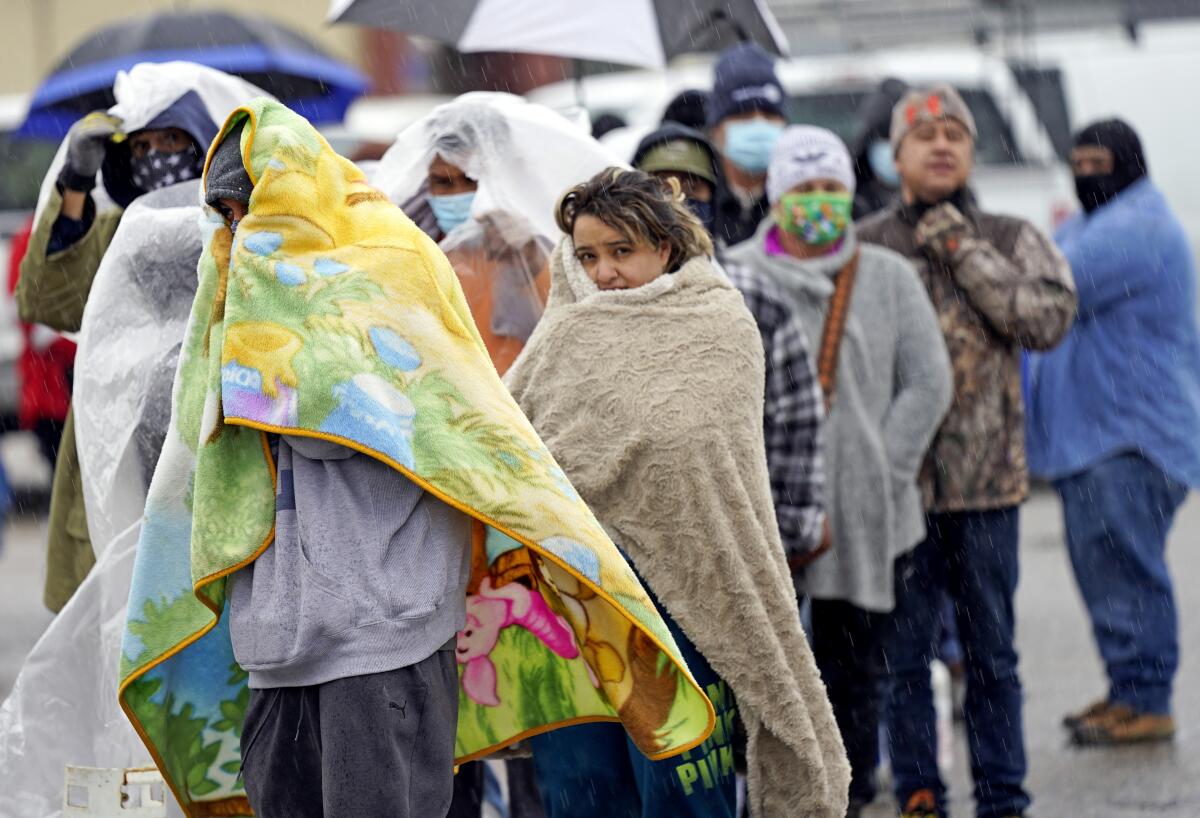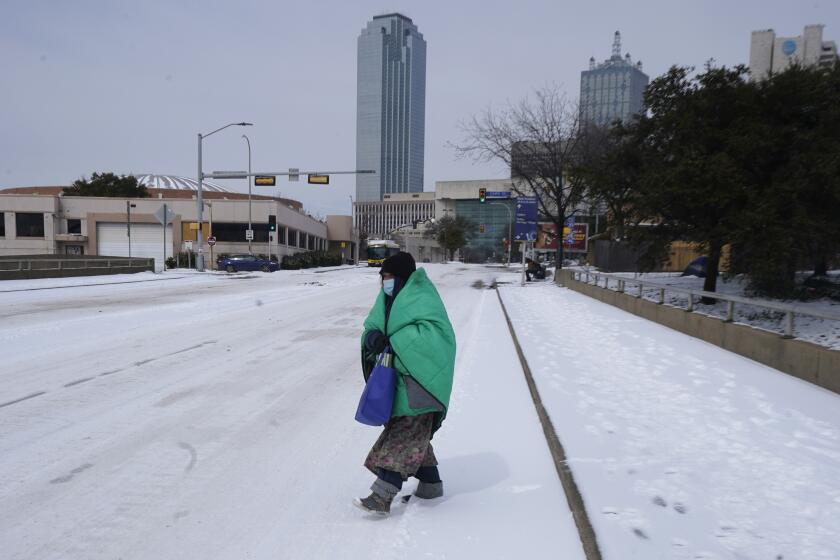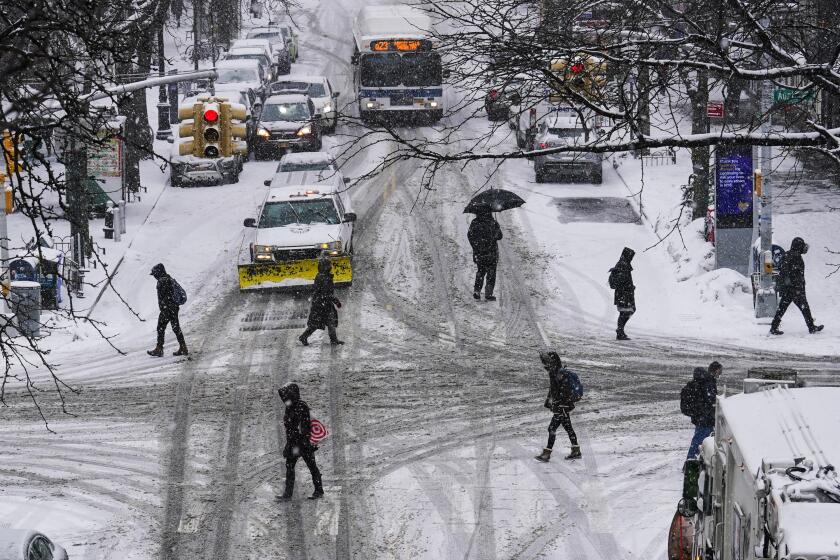A Texas-size failure, followed by a familiar Texas response: Blame California

WASHINGTON — It was tough enough for fossil fuel boosters in Texas to endure the spectacular failure of their state’s power grid, and with it all their claims of energy superiority over rival California.
But now Congress is delivering a fresh indignity to the Lone Star State: The House Oversight Committee investigation into its power failures is being led by a Silicon Valley Democrat.
There may be nobody in Congress who more personifies the California ethos Texas Republicans so loathe than Rep. Ro Khanna of Fremont, a wonky green energy champion, ally of West Coast innovators and regular on MSNBC.
“He is at the center of California’s progressive engine moving toward this alternative energy future,” said Kenneth Miller, a Claremont McKenna government professor and author of “Texas vs. California: A History of Their Struggle for the Future of America.” “To have at the national level this progressive Democrat from the belly of the beast — the Bay Area — leading an investigation of what happened in Texas is I am sure quite galling for some Texans.”
The ante has lately gone up in the decades-old feud between Texas and California. Texas was already chafing at the course President Biden had charted for electricity in America, which builds on the California model of rapidly transitioning toward wind and solar. And now, as Congress and the Biden administration dissect the reasons behind the deadly Texas outages, that state‘s leaders and fossil fuel advocates are making sure its big rival on the left coast is in the fray.
Toward a more sustainable California
Get Boiling Point, our newsletter exploring climate change, energy and the environment, and become part of the conversation — and the solution.
You may occasionally receive promotional content from the Los Angeles Times.
The majority of suffering in Texas had little to do with wind and solar. It was caused by failing gas and coal plants.
But old talking points die hard. California faced attacks and mockery when its own grid faltered amid a severe heat wave last year. Now that the Texas grid failed in a much bigger and more dangerous way, fossil fuel allies are still talking about California, often leading with misleading claims.
“We will be looking at where these lies originated from to blame renewable energy,” Khanna said in an interview. “Who came up with that strategy?”
Already, claims by some Texas leaders — including Gov. Greg Abbott and U.S. Rep. Dan Crenshaw — that wind and solar were a major culprit in the deaths in Texas have been debunked and walked back. But demonstrably false theories about the role of renewables that lit up the internet are harder to contain, according to an analysis by experts at the German Marshall Fund of the United States.
Many were sparked by a photo of a helicopter deicing what was ostensibly a frozen Texas wind turbine. Only it wasn’t. The photo had been taken in Sweden in 2014.
Electricity experts in Texas and California say the evidence is clear: The emergence of wind and solar power on the Texas grid in recent decades is not what caused at least 57 people to lose their lives, 4.5 million to be cut off from electricity in freezing temperatures and 15 million to lose access to clean water.
The issue was electricity providers failing to heed warnings to winterize their aging infrastructure, which buckled when the cold hit. Texas was then unable to draw power from other states to keep the lights on because it has long run a power grid disconnected from other states, designed to exempt Texas from federal regulations.
Extreme weather events are becoming more frequent and more severe as the planet heats up.
Yet, in Washington a narrative persists that much of this is somehow a problem created by California, much to the frustration of electricity scholars.
“The California grid sputtered for a couple of hours over the summer,” said Michael Wara, director of the climate and energy policy program at Stanford Law School. “In Texas, the whole system broke and many people died.”
He said California’s issues could be addressed by utilities keeping more backup natural gas power available over the summer, but untangling the Texas mess is infinitely more complicated, raising questions about whether the state’s lax regulations and go-it-alone approach to the electricity grid is ultimately putting lives at risk.
Some experts made that point during a hearing on problems with the grid last week. But not the witness from California committee Republicans were eager to hear from, a Berkeley climate activist who now argues the push toward renewables is driven by hysteria.
Michael Shellenberger, author of “Apocalypse Never: Why Environmental Alarmism Hurts Us All,” opined at length to the Senate Energy and Natural Resources Committee on why he believes California’s “big bet” on renewables has caused blackouts and soaring rates.
By the time the hearing came to a close, the Senate’s most credentialed expert on energy matters, former utility executive Sen. Angus King (I-Maine), said bluntly to Shellenberger: “I disagree with pretty much everything you have said.”
Deadly blast of winter overwhelmed the electrical grid and left millions in the deadly cold this week.
Republican Sen. John Barasso of Wyoming found the comments more inspired. He used them to frame the Texas disaster as a warning of what is to come if the Biden administration continues to allow its energy policy to be guided by California.
“The blackouts that we witnessed in California in 2019 and 2020, as well as the blackouts across the central part of the country last month, are unacceptable,” he said. “What is also unacceptable are proposals that would make blackouts more likely or more devastating.”
Barasso charged that Biden’s plan to decarbonize the power sector by 2035 is exactly such a proposal, invoking California again, noting that even it is not attempting a timeline so ambitious.
It all leaves the Silicon Valley congressman investigating the Texas failures to navigate impossible terrain. He is currently collecting documents from Texas regulators, with plans to hold a hearing sometime next month.
“My approach is to make it factual,” Khanna said. “We are really looking at what went wrong and what needs to happen. We are not inviting people who have a political agenda.”
Even so, any such hearing run by a Bay Area Democrat is unlikely to be received well by many Texas leaders, especially as Khanna works to exonerate wind and solar power.
One of the leading electricity experts in Texas, Michael Webber, a professor of energy resources at the University of Texas at Austin, finds it all ironic. He said his state’s steadfast allegiance to fossil fuel electricity is coming at the cost of a big opportunity — to make a buck off Californians.
“The fascinating thing here is that if we actually did connect Texas to the Western power grids, we could sell you Californians a lot of wind and solar power for a handsome profit,” he said.
Land is substantially cheaper in Texas and the environmental review for big wind and solar projects far less stringent, Webber said, meaning the state could produce renewable energy far more efficiently and then offload it to California, which is always looking for more.
“This is an opportunity Texas is missing because of obstinance and fear of the feds,” he said. “If we could get over that, we could make a lot of money off California.”
More to Read
Get the L.A. Times Politics newsletter
Deeply reported insights into legislation, politics and policy from Sacramento, Washington and beyond. In your inbox three times per week.
You may occasionally receive promotional content from the Los Angeles Times.













